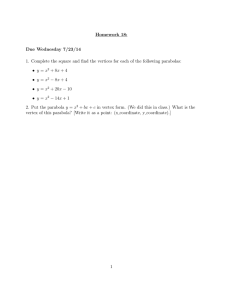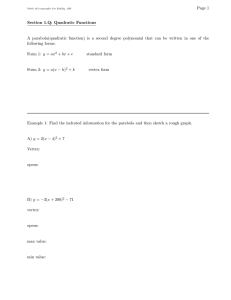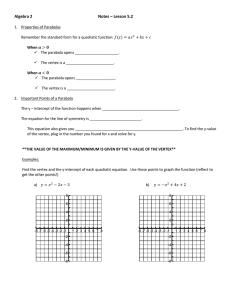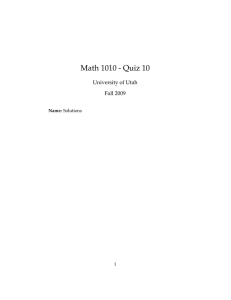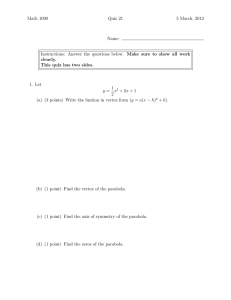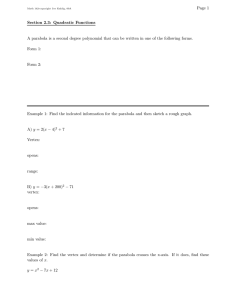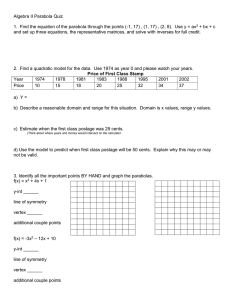Lesson 36 MA 152, Section 3.2 (parabolas) and append...
advertisement
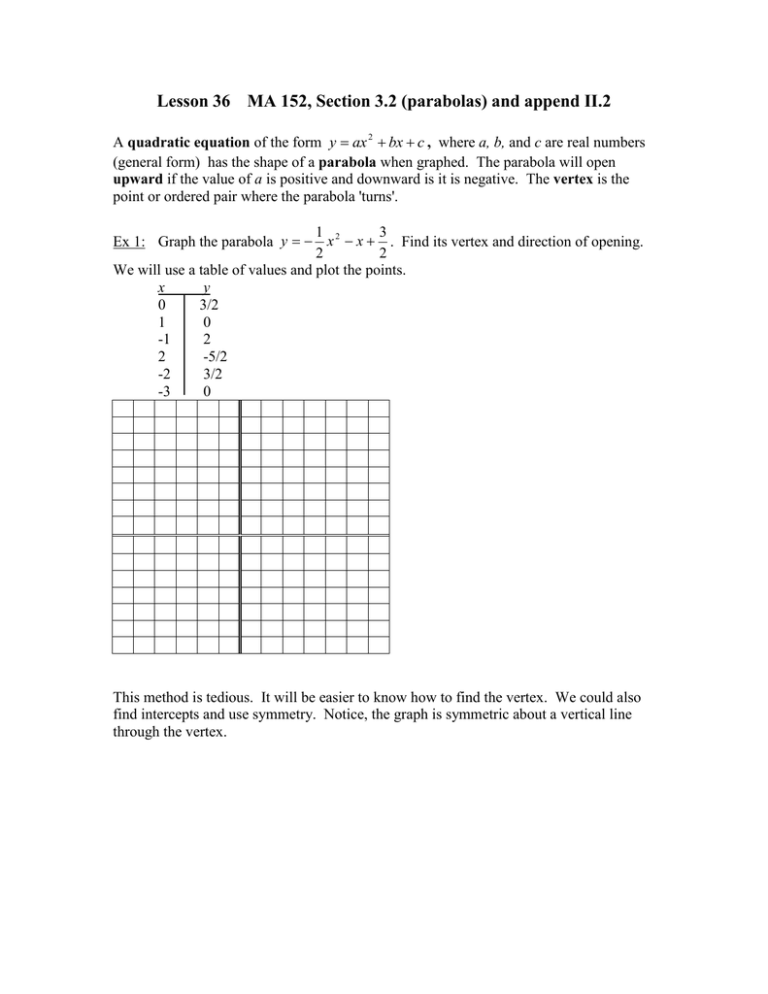
Lesson 36 MA 152, Section 3.2 (parabolas) and append II.2 A quadratic equation of the form y ax 2 bx c , where a, b, and c are real numbers (general form) has the shape of a parabola when graphed. The parabola will open upward if the value of a is positive and downward is it is negative. The vertex is the point or ordered pair where the parabola 'turns'. 1 3 Ex 1: Graph the parabola y x 2 x . Find its vertex and direction of opening. 2 2 We will use a table of values and plot the points. x y 0 3/2 1 0 -1 2 2 -5/2 -2 3/2 -3 0 This method is tedious. It will be easier to know how to find the vertex. We could also find intercepts and use symmetry. Notice, the graph is symmetric about a vertical line through the vertex. There is also an axis of symmetry, a vertical line with through the vertex. Points have symmetry left and right about this vertical line. xh P1 P2 y ax 2 bx c b y a( x 2 x) c a 2 y a( x 2 b b b x ) c a a 2a 2a b Let k c a 2a b y a( x )2 k 2a b Let h 2a y a ( x h) 2 k 2 2 Standard Equation for a Parabola: If the vertex of a parabola is (h, k) and the parabola opens upward or downward, the standard equation of the parabola has the form y a( x h)2 k . If a is positive, the parabola opens upward, negative it opens downward. From the process above, you can see that the coordinates of the vertex can be found from the general form by the following. b h 2a b2 k c 4a Rather than finding k by using the formula above, it is easier to 'plug' the value of h into the equation for x and solve for y. k f (h) Ex 2: For each parabola, find its vertex, equation for axis of symmetry, and describe the direction of opening. Find the domain and the range. a ) f ( x) 2( x 4) 2 6 b) 1 2 f ( x) ( x ) 2 4 3 Ex 3: Find the vertex of each parabola. Write equations in standard form. a) f ( x) 2 x 2 4 x 7 b) 1 f ( x) x 2 8 x 2 3 Ex 4: Graph the parabola by finding the vertex and intercepts. Use symmetry. Describe axis of symmetry, vertex, domain and range (using interval notation). 1 3 y x2 2x 2 2 y ( x 2)2 4 y 16 ( x 1)2 Ex 5: From each parabola, give the equation in standard form. Assume the value of a is 1. If a parabola opens upward, its vertex is the location of a relative minimum. If it opens downward, its vertex is the location of a relative maximum. If the vertex is (h, k), the maximum of minimum value is k f (h) and it occurs when x h . Ex 6: For each quadratic function describe if it has a maximum or minimum, what the maximum or minimum value is and where it occurs, and the domain and range of the function (using interval notation). a) f ( x) 3 x 2 12 x 11 b) g ( x ) 1 2 x 4x 6 2 Ex 7: Write an quadratic function (in standard form) that has the same shape as g ( x) 2 x 2 , but with a vertex (3,12) . Ex 8: A human cannonball shoots out of a cannon and the parabolic path he travels is given by f ( x) 0.0125x 2 x 5 . a) What is the maximum height above ground and how far from the beginning (horizontally) does this occur? b) To the nearest tenth of a foot, if there was no net, how far away (horizontal direction) would he land? c) How far above the ground was the cannon when it was fired? Ex 9: Find a pair of number whose sum is 20 and whose product is as large as possible (a maximum). What is this maximum product?
